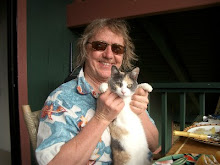Everyone thinks 'peace' is an end, a theoretical state in which there are no conflicts over differences. When there are major differences, some think unilateral application of self-justified force - war - is the only solution to 'achieve peace' and protect 'our values'.
There will never be a state in which there are no major conflicts over differences because there will never be a time when everyone 'has the same values'.
Peace is not the end, it is a means to an end. Or more explicitly, peace is having the social commitment and civil capability for fair arbitration of differences to enable coexistance of different values. Peace is the application of ethical means to non-violently arbitrate major differences as well as day-to-day differences through rule of laws designed to protect 'the common good' through consortia and unbiased application of justice. This can include consortia approved police actions which operate under rule of law to protect coexistence of different values, which is fundamentally different than unilaterally justified war to protect one set of values. Democracy is a historically successful means to enable this kind of ethical arbitration, but only if established through due process, practiced on a civil scope, and committed to consortia frameworks that scale from local to international, not just clubhouse democracy within membership of a closed value system or a single geographic entity.


0 Comments:
Post a Comment
<< Home